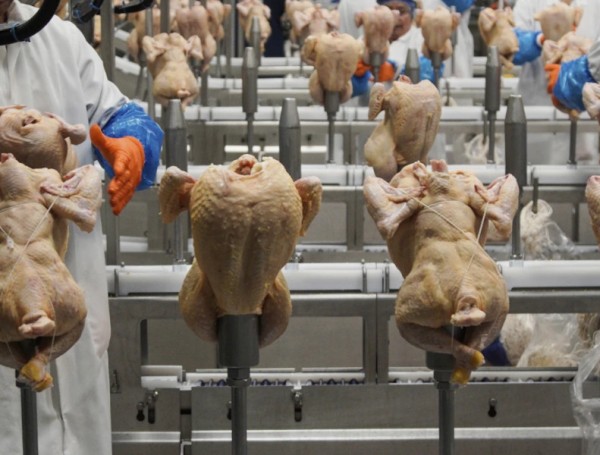BRASILIA, Brazil (AP) — Several states in Brazil are trying to rid themselves of rainforest protections, bowing to pressure from cattle ranchers and soybean growers to cut down trees and expand agriculture.
Their efforts run counter to those of President Luiz Inácio Lula da Silva, who returned to power last year and has made significant strides in curbing Amazon deforestation. They also threaten Brazil’s commitment to halt deforestation by 2030. Loss of forest is the country’s largest source of carbon emissions.
“We are detecting a well-coordinated wave of setbacks. The efforts to reduce deforestation remain highly fragile in some regions,” said Alice Thuault, executive director of Instituto Centro de Vida, an environmental nonprofit based in Mato Grosso state. A coalition of organizations that keeps watch on supply chains, the Accountability Framework initiative (AFi), also referred to the trend as “a major setback.”
Brazil’s nine Amazonian states are crucial for preserving forest. Together, they manage almost 220,000 square miles (564,000 square kilometers) of conservation lands and 12,600 square miles (32,600 square kilometers) of public forests that have no protective designation, a total area roughly the size of Ukraine.
In Acre state, a law approved unanimously in August allows the privatization of almost 347 square miles (900 square kilometers) of protected forest, an area approximately the size of New York City. The stated goal is to legalize the status of people who have illegally moved into five forested conservation units.
The state and its leading farmers´ organizations are finding common cause with Brazil´s communist party and state lawmaker Edvaldo Magalhães. In a speech in August, he said the new environmental legislation, which also lowers penalties for illegal deforestation, will benefit 40,000 small farmers. He said it will increase protected forest area, although he has not said how. Magalhães didn't return requests for an interview.
Acre’s new legislation has garnered strong support from agribusiness organizations, which have long advocated for loosening rainforest protections. “The more forest, the more poverty,” said Assuero Veronez, president of the Federation of Agriculture and Livestock of Acre, during a speech in the state parliament in April 2023.
Veronez, a cattle rancher who migrated from Brazil’s Southeast to Acre, argues that forests don't generate income and they occupy land that could be used for agriculture. “That hectare of forest — there is soil underneath it. If we cannot remove the forest, we cannot produce,” he said.
Veronez did not respond to requests for comment from the Associated Press.
Passage of the legislation prompted Acre Environment Secretary Julie Messias to resign. “The new legislation poses serious risks and may not be constitutional," Messias said. It's crucial for people to get legal status, but that has to be done consistent with Brazil's laws on forest conservation, she said. Acre Governor Gladson Cameli signed the law, but delayed its implementation until January 1 to evaluate whether it is legally binding.
The prospect that the protected areas in Acre could be privatized led to a surge in deforestation, according to a satellite image analysis requested by the AP from the nonprofit Amazon Institute of People and the Environment. From August to October, illegal deforestation in four protected areas surged more than threefold over the year before, to roughly the area of six Central Parks.
The damage was much worse in neighboring Rondonia state, where the Assembly and local government are in court seeking to annul 11 conservation units and reduce two others. In two of them alone, Guajara-Mirim and Soldado da Borracha, fires that were deliberately set destroyed a combined area of 668 square miles (1,730 square kilometers), an area slightly larger than Greater London, according to MapBiomas, a network of non-governmental organizations that monitors land use.
Rondonia state prosecutor Pablo Viscardi said the fires are the work of people who want to gain legal title to the land. They “use forest fires to ‘consolidate’ the land-grabbing and/or prevent the regeneration of areas they were expelled from,” he told the AP.
In Rondonia and also in neighboring Mato Grosso, authorities have also ended an important piece of environmental legislation. In the historic Soy Moratorium of 2006, traders and oil producers agreed not to buy soy beans grown on recently deforested land. Environmental groups including Greenpeace and U.S. commodity giant companies Cargill, Bunge and ADM were parties. Now the laws in Mato Grosso, Brazil’s largest soybean and beef-producing state, and Rondonia, force traders and oil producers to exit the agreement.
Another Amazonian state, Para, is pushing a similar initiative. According to Directa, a law consulting company, the bill closely resembles the ones in Mato Grosso and Rondonia, suggesting a coordinated effort to undermine the soy moratorium.
Critics of the moratorium, which include Brazil´s top soy producer associations, argue that the agreement is illegal because it goes beyond Brazil´s anti-deforestation laws. In a statement, the government of Mato Grosso said it ceased incentives under the soy moratorium because the state already enforces “the world’s strictest environmental regulations” and companies that violate national laws will face penalties, just as they would in other countries.
Brazil is the world’s fifth-largest emitter of greenhouse gases, with almost 3% of global emissions, according to Climate Watch, an online platform managed by World Resources Institute. Almost half of Brazil’s carbon emissions come from deforestation. The Amazon is a vital climate regulator, contains the most biodiverse forest in the world plus one-fifth of the world´s freshwater.
___
The Associated Press’ climate and environmental coverage receives financial support from multiple private foundations. AP is solely responsible for all content. Find AP’s standards for working with philanthropies, a list of supporters and funded coverage areas at AP.org.

















